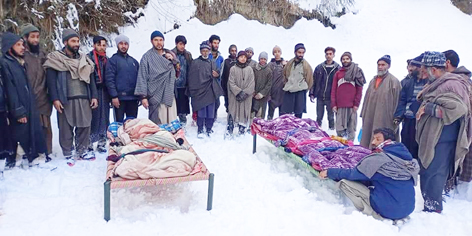
Woman delivers triplets at DH Handwara
Irfan Tramboo
Srinagar, Jan 24: Yet again, the fresh snowfall across Kashmir Valley has returned with miseries, hardships and hassles for the patients who in the state of emergency had to reach nearby hospitals from far-flung areas of the North as well as in South Kashmir.
Those who were most affected amid roads covered with snow and were unable to reach the hospitals were the pregnant women who were then taken to nearby hospitals for medical attention on stretchers.
In North Kashmir’s Shirpora area, a pregnant woman who was also suffering from heart ailments was taken to a nearby hospital in Chandusa on a stretcher with the help of locals as well as the police personnel in the area.
“Her condition was not stable and there was a need of taking her to a nearby hospital for treatment, but that appeared to be impossible due to snowfall. Then, the locals with the help of police personnel, were able to bring her down from Shirpora to Chandusa,” a relative of the patient said.
In Hangnikoot village of Villgam in North Kashmir’s Handwara, people had to take a 30-years-old pregnant woman and an elderly patient to a nearby hospital on stretchers.
The woman, as per locals, developed labour pain today morning which prompted her husband to call the neighbours and relatives for help. The lady was wrapped in a blanket and put on a stretcher and was taken to a health-centre in Taratpora.
The elderly person from the same Hangnikoot village was also wrapped up in a blanket and put on a stretcher. He, as per reports, was also carried on shoulders to nearby health-centre in Taratpora.
The attendants of the elder person later alleged that the hospital authorities at DH Handwara denied them ambulance and were told to utilize the Sumo service instead.
In another incident, a pregnant woman was referred from a health care facility in North Kashmir’s Kralpora to District Hospital Handwara. The women had to be brought down from a far off and hard-to-reach area of the district known as Budnambal.
Upon reaching Kralpora with the help of strenuous efforts of her family and others, the patient named Ateeqa Begum was then referred to DH Handwara where she luckily gave birth to triplets.
Medical Superintendent DH Handwara Nisar Ahmad Wani told Excelsior that upon referral she was attended by the specialist doctors who were on duty and later gave birth to triplets who are now doing well.
“She is basically from Budnambal area of the district which is a far off area and from there, they had managed to reach Kralpora wherefrom she was referred here. We took due care of her,” he said.
The mother as well as the newborn are said to be doing well. However, the doctors told Excelsior that the triplets had low birth weight because of which they were later referred to Srinagar’s GB Pant Hospital where they are doing comparatively good.
In another incident, in far off Lolab, security forces had to come to the rescue of a newborn and a mother who were trying to reach to their residence amid snowfall. With the help of the forces personnel, they were carried for about 6 kilometres and were finally dropped off at their residence.
Doctors believe that such events add to the mental trauma of the patients, particularly the pregnant women who are at the peak of fragility at the time of the labour. “The impact of what they go through during such time can lingers around for long,” doctors said.
Notably, during the earlier spell of heavy snowfall which brought the Valley to a grinding halt, there were at least two dozen of incidents where the patients, especially, pregnant were taken to nearby hospitals on stretchers.
In one such incident in a far off area of Shopian, a lady had delivered a baby under a tin-shed while she was being taken to a nearby hospital for immediate medical attention by the locals and police.
In several districts, the police had to issue helpline numbers for those who needed help in case of emergencies.

